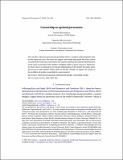Files in this item
Censorship as optimal persuasion
Item metadata
| dc.contributor.author | Kolotilin, Anton | |
| dc.contributor.author | Mylovanov, Timofiy | |
| dc.contributor.author | Zapechelnyuk, Andriy | |
| dc.date.accessioned | 2022-05-16T09:31:48Z | |
| dc.date.available | 2022-05-16T09:31:48Z | |
| dc.date.issued | 2022-05-05 | |
| dc.identifier.citation | Kolotilin , A , Mylovanov , T & Zapechelnyuk , A 2022 , ' Censorship as optimal persuasion ' , Theoretical Economics , vol. 17 , no. 2 , pp. 561-585 . https://doi.org/10.3982/te4071 | en |
| dc.identifier.issn | 1933-6837 | |
| dc.identifier.other | PURE: 279577567 | |
| dc.identifier.other | PURE UUID: dc1c80e5-45d7-46a9-99ec-821c11c4769c | |
| dc.identifier.other | Jisc: 308551 | |
| dc.identifier.other | WOS: 000799894500006 | |
| dc.identifier.other | Scopus: 85130592802 | |
| dc.identifier.uri | https://hdl.handle.net/10023/25375 | |
| dc.description | Kolotilin acknowledges financial support from the Australian Research Council Discovery Early Career Research Award DE160100964 and from MIT Sloan’s Program on Innovation in Markets and Organizations. Mylovanov acknowledges financial support from the Office of Naval Research Multidisciplinary University Research Initiative Award N0001417-1-2675 and from Kyiv School of Economics. Zapechelnyuk acknowledges financial support from the Economic and Social Research Council Grant ES/N01829X/1. | en |
| dc.description.abstract | We consider a Bayesian persuasion problem where a sender's utility depends only on the expected state. We show that upper censorship that pools the states above a cutoff and reveals the states below the cutoff is optimal for all prior distributions of the state if and only if the sender's marginal utility is quasi‐concave. Moreover, we show that it is optimal to reveal less information if the sender becomes more risk averse or the sender's utility shifts to the left. Finally, we apply our results to the problem of media censorship by a government. | |
| dc.format.extent | 25 | |
| dc.language.iso | eng | |
| dc.relation.ispartof | Theoretical Economics | en |
| dc.rights | Copyright © 2022 The Authors. Open Access. Licensed under the Creative Commons Attribution-NonCommercial License 4.0. Available at https://doi.org/10.3982/TE4071 | en |
| dc.subject | Bayesian persuasion | en |
| dc.subject | Information design | en |
| dc.subject | Censorship | en |
| dc.subject | Media | en |
| dc.subject | QA75 Electronic computers. Computer science | en |
| dc.subject | HB Economic Theory | en |
| dc.subject | T-NDAS | en |
| dc.subject | NCAD | en |
| dc.subject | MCC | en |
| dc.subject.lcc | QA75 | en |
| dc.subject.lcc | HB | en |
| dc.title | Censorship as optimal persuasion | en |
| dc.type | Journal article | en |
| dc.contributor.sponsor | Economic & Social Research Council | en |
| dc.description.version | Publisher PDF | en |
| dc.contributor.institution | University of St Andrews. School of Economics and Finance | en |
| dc.identifier.doi | https://doi.org/10.3982/te4071 | |
| dc.description.status | Peer reviewed | en |
| dc.identifier.grantnumber | ES/N01829X/1 | en |
This item appears in the following Collection(s)
Items in the St Andrews Research Repository are protected by copyright, with all rights reserved, unless otherwise indicated.

